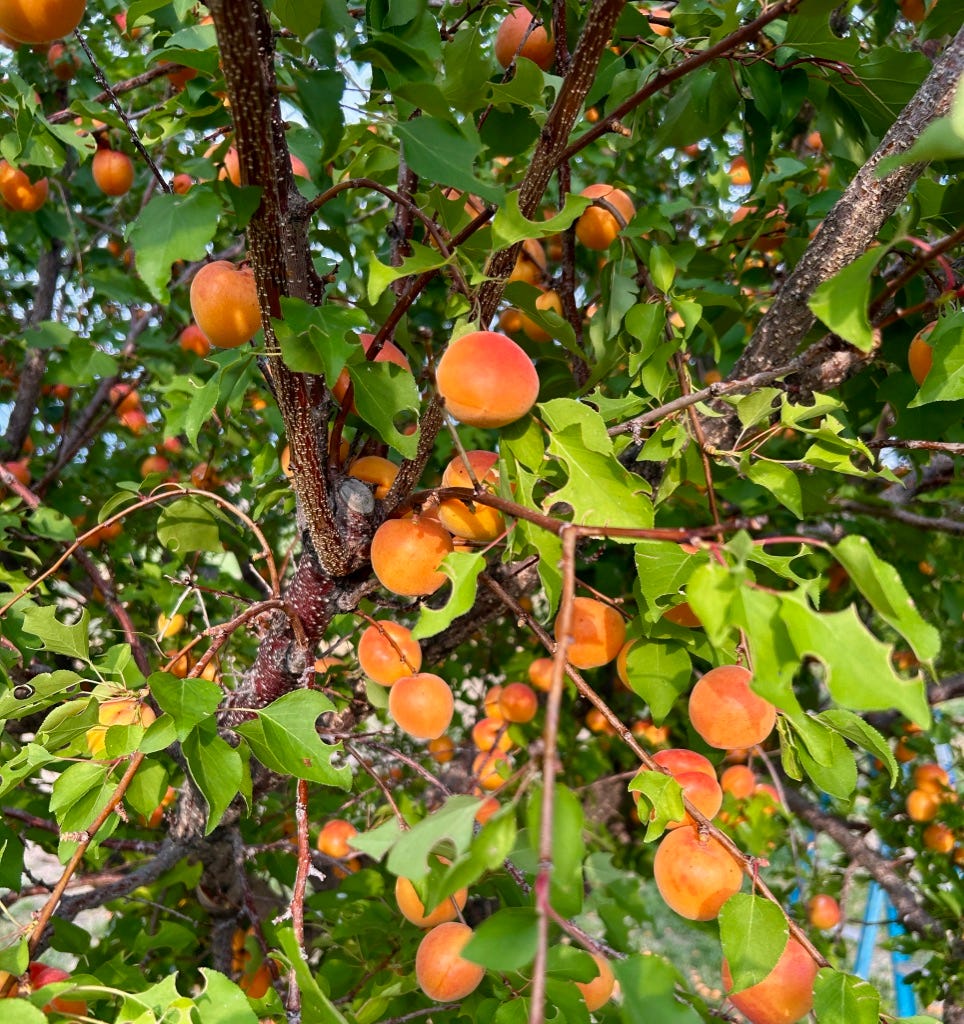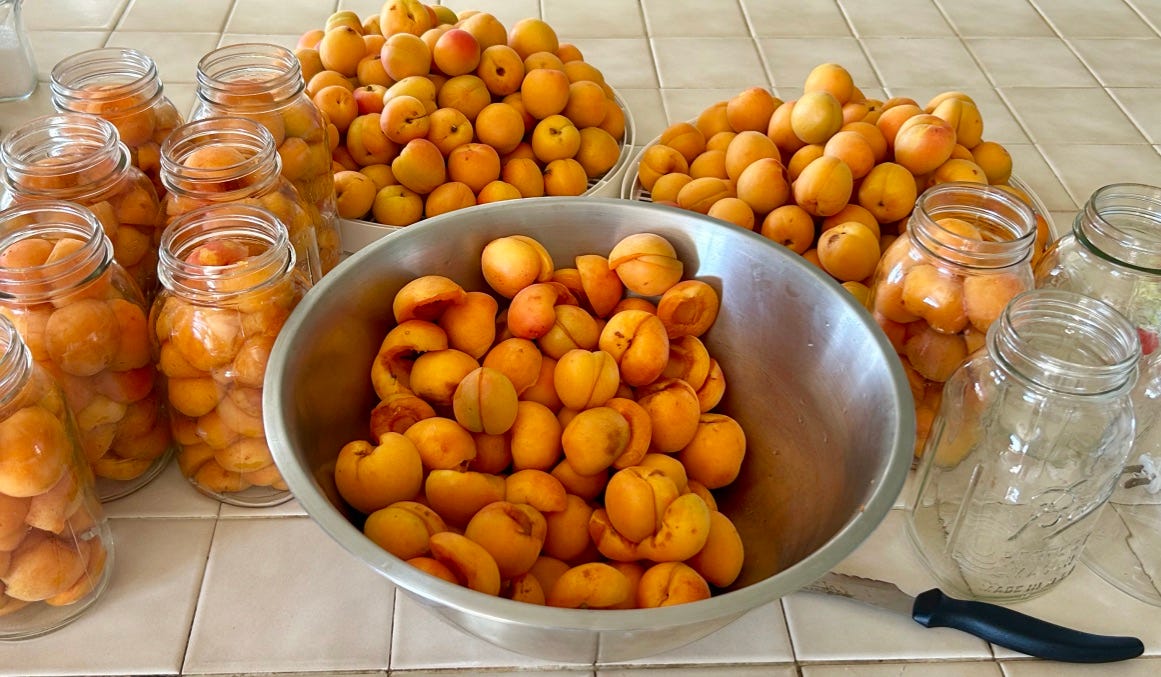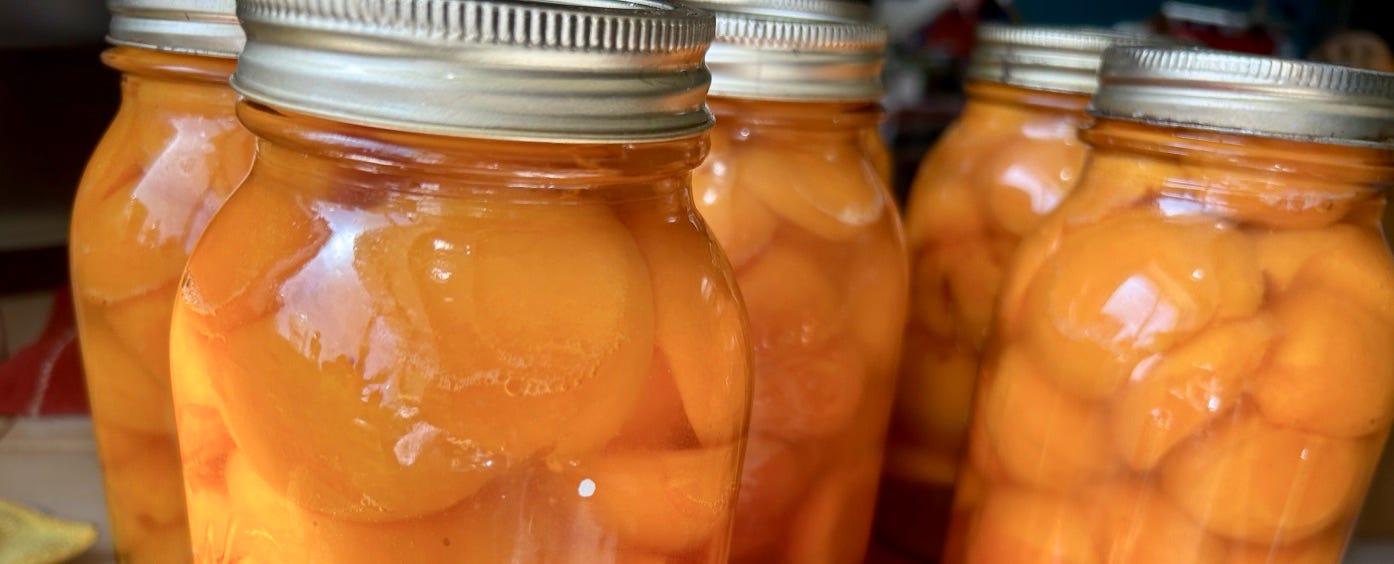I’m canning apricots at my brother’s house. After 15 fruitless years, his tree sends down a cascade of orange orbs. We take buckets and boxes into the corner of the orchard where the tree droops with its burden and pick only the ripening fruit. Western Kingbirds and Bullock’s Orioles have already added the tree to their list of dining possibilities. They know a ripe apricot when they see one, and the sweetest fruits are incised with ragged papaya-colored canyons. Black-chinned Hummingbirds are more circumspect, sipping nectar through tiny holes they have punctured with the thin needle of their bill. After three boxes of apricots, the tree hardly notices that we’ve been there.
I’m canning apricots at my brother’s house because my mother is dying in the next room. Her approach to death is a slow stalk. I like the idea that Mom is stalking death. She always said my mother didn’t raise her daughters to be nice little old ladies! Mom is a tough woman. Even though she started hospice care two days ago, we expect her to stalk death for quite some time. So I have come equipped with canning jars, rings, lids, water-bath canner, honey, and a food dehydrator for processing a lot of apricots.
I like the idea that I’m canning apricots for Mom, even though the 30 trillion cells that have collaborated to keep her body alive for 89 years are shutting down, and she no longer needs food. She grew up as a post-Depression kid in rural western Oregon and spent her life putting up food of all kinds. Eventually she honed those life skills by becoming a certified master food preserver. Three of her four boys are also canners. From a material point of view, we don’t need to put up food. None of us are poor, and we could buy everything we would ever eat. We preserve food anyway—because in my family, stored food isn’t just tradition or love; it’s a form of security far superior to a bank account. None of us have gone hungry for a day in our lives, and still we like to say that it takes a lot of salt to eat a dollar bill. Today I’m canning because these are Mom’s dying days, and I need to show her a jar of apricots.
Every summer I become a canning fool, putting up uncounted jars of pears, peaches, tomatoes, and applesauce. While my experience preserving apricots is limited, I fall in love quickly. The small fruit rides easily in my palm. A quick slice with a paring knife flays glistening flesh, exposing the chocolate pebble of a pit that is easily removed. The soft skin is bat-wing thin, so peeling is unnecessary. What a luxury! The split fruit piles up rapidly in a large stainless steel bowl. Blemished flesh and pits land in another bowl, and later I’ll feed the castoff pieces to the Ring-necked Pheasants my brother is raising out beyond the hay barn. When the apricot bowl is heaping, I remember to put water in the canner pot and put it on the range to heat. I also need to heat up the honey syrup that will bathe the apricots in a limited form of perpetuity (perpetuity is always limited in some way). I should have put the syrup and canner water on while I was removing the pits, but efficiency doesn’t always figure into the equation of dying.
After rinsing and drying my hands, I go to sit with Mom. Hospice has provided a hospital bed that we have placed in the living room she has occupied most days for nearly a year. Two large windows look south and west toward the horse stables. Beyond the stables lies an emerald expanse of alfalfa. The valley ends at a gray ridge of sagebrush and rimrock a treeless mile away.
Southeastern Oregon is not Mom’s native habitat. She spent most of her life in the watery verdure of western Oregon. But my brother and his wife are heroically committed to keeping her out of assisted living, and for nearly a year their house has been her best last alternative.
Mom’s granddaughter and her caregiver have remained devoted to her over these last days. They relinquish some space next to the bed. For most of her adult life, Mom kept her thick hair dyed, but has now let it grow out gray. Her furrowed skin is bronzed--only a week ago she was sitting on the patio basking in the sun of a passing summer. I know the sky blue shirt she wears is a match to her eyes, even though they are closed. In these last months I am struck by how she has come to look like her mother Grammy.
My hand finds the wrinkled tan of her forehead. Her eyes remain closed. Mom, you’ll never believe Todd’s apricot tree. It’s absolutely loaded! Blue eyes open. She makes some sounds. Most of her words have become unintelligible to me. Yet I know she always loves a good fruit story. I’m canning as many of them as I can. More undecipherable sounds. I’ll bring you one. I return from the kitchen with a single apricot and place it in her hand. Let her fingers curl over velvety skin, a baby’s butt in miniature. I put the apricot on the nearby woodstove that last winter consumed seven cords of firewood cut and stacked by my brothers for keeping her warm through a harsh southeastern Oregon winter. I’m not sure she can see the small orange-ness of it.
By now the syrup and canner water are hot. I return to the kitchen, pack apricot halves into quart jars. I’m a ridiculous perfectionist when packing fruit into canning jars. I nestle in layers of fruit, each half facing down. Pour in hot syrup made from my backyard honey. The steam rising into my nostrils reminds me I haven't yet removed this summer’s honey frames. Some parts of life need to wait on death. The scalded lids are finally in place over clean jar rims, rings are spun on and tightened just so. After 25 minutes in simmering water, I hoist the jars out of the canner and onto the counter. The golden glow of apricots under glass is accentuated by the honey syrup. Lids begin to pop as they seal. My feet are sticking to the floor. I am in love with apricots.
I repeat the process with another canner load of fruit. When the jars are simmering I return to the living room. Hey Mom, I just took out the first load of apricots. Do you wanna to see them? She sends out a small sound with a steep upward inflection. After 66 years with her, I translate it immediately. Well yeah! The jars of fruit are still hot, so I nestle one into a dishtowel and bring it into the living room. Hold the golden glow level with those alert blue eyes. Tell her it’s still too hot to touch. Her mouth is too tired to smile, but I know the smile lives there. Somewhere.
***
I was canning apricots because my mother was dying. She took her last small breaths one evening a week ago. Now I’ve returned to the Willamette Valley where she raised me, where winter rains spawn salmon and chanterelles with apricot flesh. This morning the lush womb of summer is obscured by smoke from wildfires to the east. I’m stalking grief, searching for loss that also seems obscured, elusive. I wonder how a life can so quickly become empty space, as if the world has closed up the vacuum left by a lifetime of love with only a leaf rustle, or perhaps the faint pop of a sealing canning jar. This morning, Sun climbs into the smoky shroud. And yes. Yes, his aura is the color of a ripe apricot.






Tom,
Thank for these words, so beautifully crafted into story as clear in my mind’s eye as a Spring rain falling on Purple Columbine.
Writing about events like this, you connect the immediate with the eternal. More hugs.